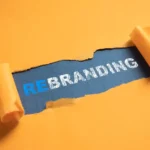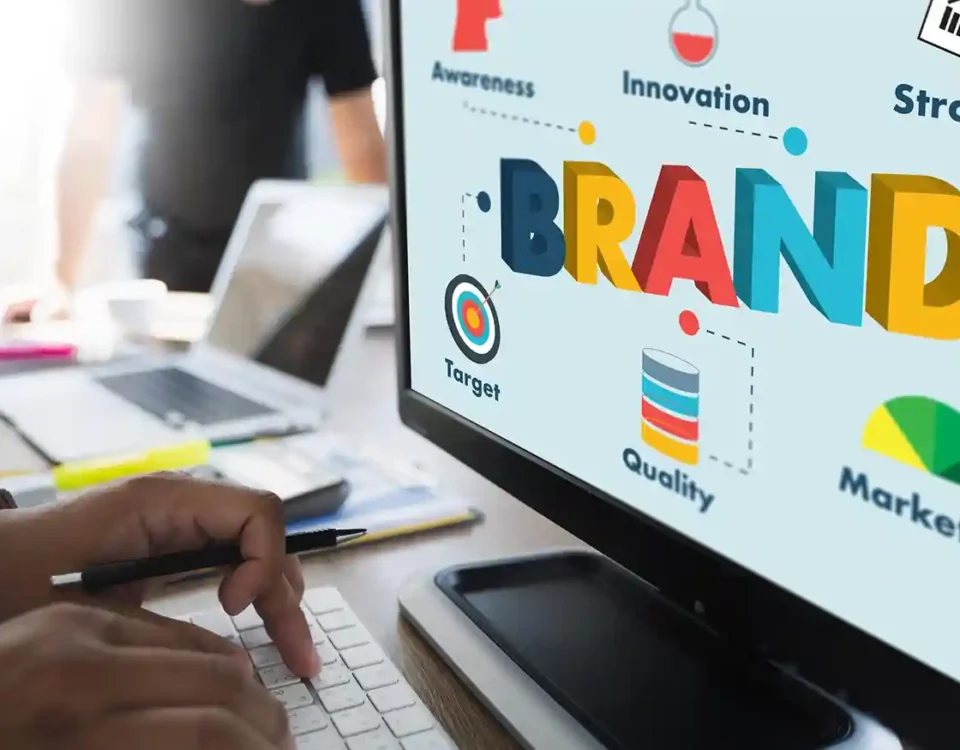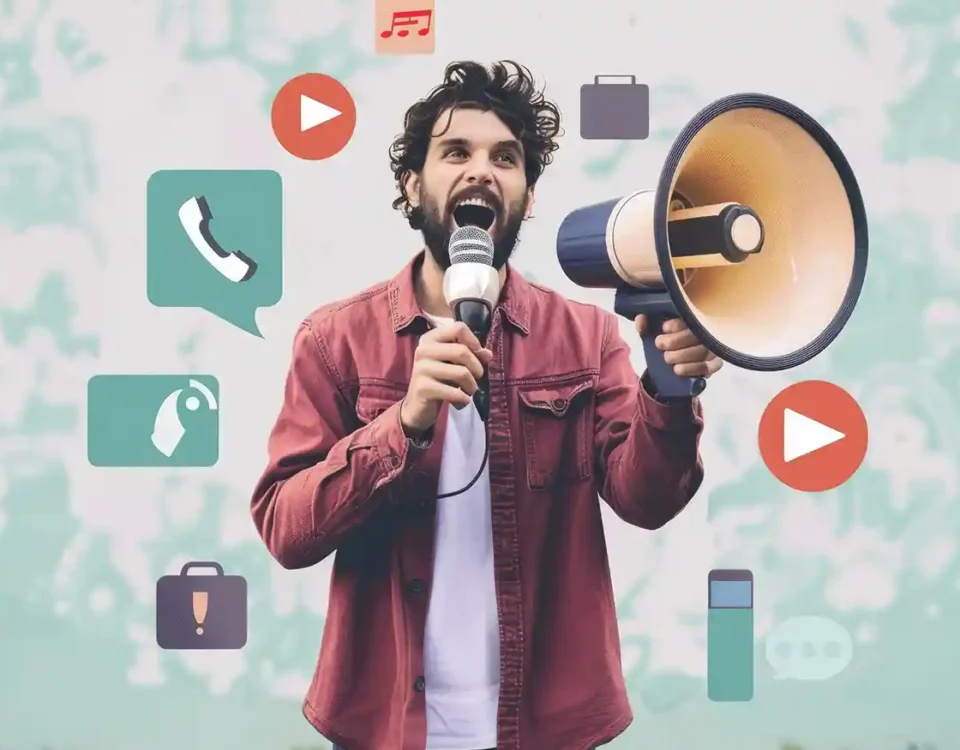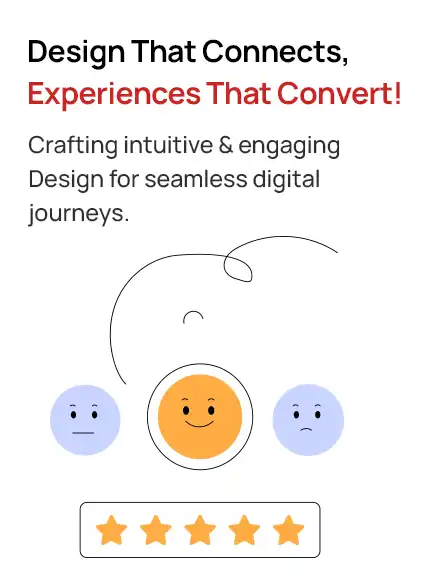
Investor Pitch Deck: How to Present Your Startup for Funding Success
October 6, 2025
What Does a Corporate Rebranding Agency Do? A Complete Guide for Businesses
October 14, 2025
Investor Pitch Deck: How to Present Your Startup for Funding Success
October 6, 2025
What Does a Corporate Rebranding Agency Do? A Complete Guide for Businesses
October 14, 2025The Complete Guide to Event Branding: From Concept to Execution
October 10, 2025
- 18 min to Read
Introduction
Did you know that over 85% of attendees say event branding influences their overall perception of an event—even before they step in (or log on)?
In the digital era, the success of an event isn’t defined by just great speakers, a polished agenda, or a well-designed stage. It’s shaped by the experience you build around your brand. A thoughtfully branded event leaves a lasting impression, builds trust, and turns attendees into advocates.
Whether it’s a product launch, a global conference, or an intimate internal gathering, strategic event branding helps your audience connect emotionally with your purpose.
In this guide, we’ll walk you through the entire journey of event branding — from concept to execution — with a sharp focus on building a strong digital presence. You’ll discover creative event branding ideas, actionable strategies, and proven methods to make your event stand out in a crowded online world.
What Is Event Branding?
Event branding is more than designing a logo or a catchy tagline. It’s the strategic process of building a consistent identity for your event that resonates with your audience. It involves defining the visuals, tone, and experience — making sure every digital and physical touchpoint communicates your brand message clearly.
In the digital age, branding in events has become a vital part of marketing. With most events now being virtual or hybrid, a consistent and memorable digital presence ensures your event captures attention long before it begins.
Why Digital Event Branding Matters1. Builds Recognition: Consistent colors, visuals, and messages across channels make your event instantly recognizable.
2. Boosts Engagement: A unified identity keeps your audience curious and connected.
3. Establishes Trust: Professionally branded events convey authority and organization.
4. Drives ROI: Strong branding attracts sponsors, builds loyalty, and encourages future participation.
Pre-Event Planning: Laying the Foundation
Before you start designing assets or writing posts, a clear strategy is essential.
Define Your Objectives
Ask yourself:
- What is the primary purpose of the event — awareness, networking, or lead generation?
- What do you want attendees to feel and remember?
Know Your Audience
The foundation of successful corporate event branding lies in understanding who you’re talking to. Research your audience demographics, digital habits, and preferences. Identify which platforms they use and what type of content captures their interest.
This understanding allows you to design branding that feels personal, relevant, and engaging.
Create a Theme and Messaging
Your event needs a central theme — a story that ties everything together. It could be “Innovation in Action,” “The Future of Wellness,” or “Shaping Digital Tomorrow.” The theme becomes your narrative, influencing everything from design to tone.
Craft a short, memorable tagline and ensure consistent messaging across all materials, from landing pages to social media posts.
Develop Your Visual Identity
A strong visual identity helps people recognize your event instantly. Build a simple style guide that includes:
- Logo: Unique and event-specific, yet in harmony with your main brand.
- Color Palette: Choose 2–4 main colors that evoke your event’s mood.
- Typography: Clean, readable fonts used consistently across designs.
- Imagery: Define a consistent photography or illustration style.
Digital Channels for Event Branding
Once your foundation is set, it’s time to build your digital ecosystem. Let’s explore the main channels where your event branding should shin
1. Website or Landing Page
Your event website is your most important digital asset. It’s often the first interaction attendees have with your brand.
Key elements to include:
- A visually appealing hero section with your logo, tagline, and dates.
- Clear CTAs (register, view agenda, contact).
- Speaker details, schedules, and sponsor information.
- Branded visuals consistent with your event’s theme.
Keep your website optimized for mobile devices, and include SEO keywords like event branding ideas and corporate event branding in titles and meta descriptions.
2. Social Media Presence and Content Strategy
Social media brings your event to life before it even begins. It’s where you build anticipation, share updates, and engage directly with your audience.
Pre-Event:
- Share teaser videos, speaker introductions, and countdown posts.
- Use branded templates for consistency.
- Create a dedicated event hashtag.
During the Event:
- Share live clips, Q&A sessions, and polls.
- Repost user-generated content using your hashtag.
After the Event:
- Highlight best moments, thank attendees, and post key takeaways.
Consistency across all platforms ensures your brand looks unified — an essential part of branding in events.
3. Marketing Assets: Brochures, Flyers, and Digital PDFs
Even in a digital space, well-designed marketing materials help reinforce your event identity.
- Create branded digital brochures summarizing the event benefits, agenda, and speakers.
- Use short, impactful copy paired with clean visuals.
- Ensure all files carry your logo and brand colors.
You can distribute these through email campaigns, sponsor channels, or your event’s registration page.
4. Effective Pitch Decks and Presentations
For B2B events or conferences, a professionally branded pitch deck makes a powerful impression.
- Use a consistent slide design with your event logo and color palette.
- Include minimal text, bold visuals, and strong takeaways.
- Share branded presentation templates with speakers and sponsors to maintain consistency.
5. Video Marketing
Videos are among the most engaging forms of event promotion. They help you tell your event’s story visually and emotionally.
Ideas for event video content:
- A short promo video introducing the event’s theme and speakers.
- Behind-the-scenes clips showing preparation.
- Highlight reels after the event to maintain momentum.
6. Email Campaigns and Invitations
Email marketing remains one of the most powerful tools for driving attendance and engagement.
Tips for effective email branding:
- Use consistent colors, logos, and font styles.
- Include clear calls-to-action (Register Now, Save Your Spot).
- Send pre-event reminders and personalized thank-you emails afterward.
7. Swag and Branded Merchandise
Even in digital events, swag can create tangible excitement.
- For physical attendees: T-shirts, notebooks, mugs, and tote bags.
- For online attendees: Digital wallpapers, virtual backgrounds, certificates, or downloadable stickers.
Event Branding Execution
After setting up your digital assets, it’s time to bring everything together cohesively.
- Double-check that all designs follow your brand guide.
- Schedule social media posts and email campaigns in advance.
- Provide your speakers and sponsors with branded materials to maintain consistency.
- Ensure your website, registration system, and digital banners are tested and functional.
An aligned execution helps attendees experience your brand in a seamless, professional way.
Measuring Event Branding Success
A good branding strategy doesn’t end when the event does — measurement is key to understanding impact.
1. Website Analytics
Track registration rates, traffic sources, and page interactions.
2. Social Media Metrics
Measure hashtag usage, engagement rates, and reach.
3. Email Metrics
Look at open rates, click-throughs, and conversions.
4. Attendee Feedback
Post-event surveys help you evaluate how attendees perceived your brand.
5. ROI Analysis
Measure how branding influenced attendance, sponsorships, and post-event engagement. Strong branding often leads to higher satisfaction and better long-term loyalty.
Case Studies: What Great Event Branding Examples
- Adobe MAX
Known as “The Creativity Conference,” Adobe MAX blends bold visuals, motion, and color to celebrate innovation. Its consistent yet evolving design each year reflects Adobe’s creative spirit and inspires global audiences.
- Figma Config
Figma’s annual event captures the brand’s collaborative and modern identity. With clean layouts, vibrant gradients, and interactive digital elements, it shows how thoughtful design can bring a community together.
- HubSpot INBOUND
INBOUND stands out for its energetic color palette, engaging tone, and consistent digital storytelling. Every edition feels fresh yet unmistakably “HubSpot,” proving that emotion and consistency are key in event branding.
Tips for Successful Event Branding
- Start Early: Begin branding during the event planning stage.
- Be Consistent: Apply your logo, fonts, and colors across all materials.
- Engage Continuously: Keep your audience involved before, during, and after the event.
- Use Storytelling: Connect your event message to your audience’s emotions.
- Partner Wisely: Work with reliable event branding services to ensure professional quality.
- Optimize for SEO: Use relevant keywords naturally throughout your content and assets.
- Evaluate and Evolve: Use post-event data to improve future branding strategies.
Next Steps for Event Branding Success
Event branding is more than a design task — it’s an experience-building process. The strongest events don’t just inform or entertain; they connect people through a unified story and identity.
By following a strategic approach — defining objectives, building a visual system, executing across all digital channels, and measuring results — you can create events that leave a lasting mark.
Whether you’re organizing a global conference, a local meetup, or a virtual product launch, these event branding ideas will help you stand out, engage your audience, and strengthen your overall brand image.
If you’re unsure where to start, partnering with a professional agency like Upclues – Event Branding Agency can ensure consistency, quality, and creative direction throughout your campaign.
In the end, effective branding in events is not just about visuals — it’s about crafting experiences people remember, share, and associate with your name long after the event is over.





